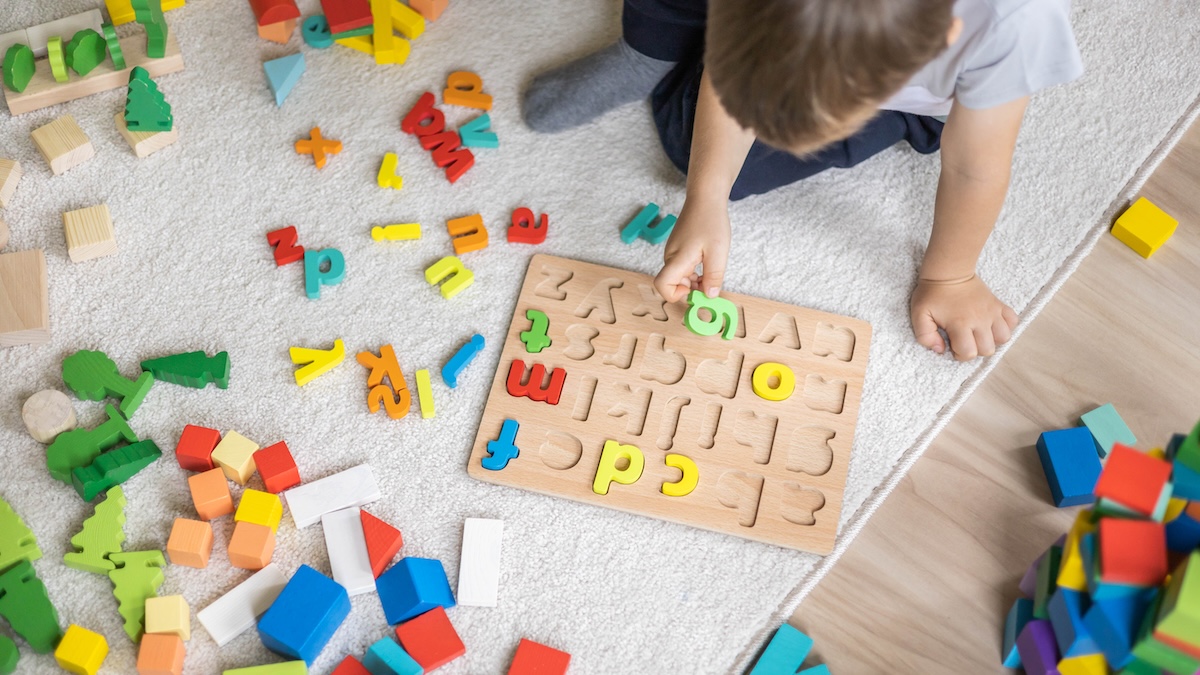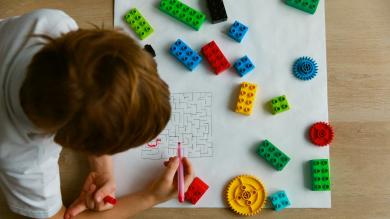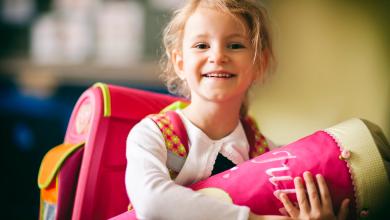
Giftedness in children: recognizing, understanding, accompanying
Many parents ask themselves: Is my child gifted? How could I recognize this? And what does this mean for everyday life in the family, kindergarten or school? Some imagine gifted children as effortless high-flyers with top grades, while others see them as bored, underchallenged pupils who don't fulfill their potential. Their social relationships are also often viewed critically - do they connect easily or do they struggle?
In this article, you will learn how to recognize giftedness in children, what challenges and opportunities it brings and how you can best support your child with giftedness.
An article by Rebecca Brielmaier, trained educator, pedagogue and specialist consultant in the area of parent & child at pme Familienservice.
Giftedness in children is characterized by special abilities in different areas such as thinking, language or creativity. Typical signs are a high level of curiosity, quick comprehension, emotional depth and behavioral patterns such as restlessness during routine, perfectionism or clowning.
Sensitive and individual support that takes cognitive, social and emotional needs into account is important for healthy development. Parents should observe their child closely and, if giftedness is suspected, make use of professional diagnostics and exchanges with specialists in order to avoid over- or underchallenging their child and develop their potential to the best of their ability.
What you can expect in this article
- What does giftedness mean in children?
- How do children with giftedness behave?
- How can parents recognize giftedness in their child? 9 Characteristics
- What should parents do if they suspect giftedness?
- How can giftedness be identified in children?
- How can parents support their gifted children?
- FAQ: Recognizing giftedness in children
What does giftedness mean in children?
We talk about giftedness when children show clearly above-average abilities - be it in thinking, language, dealing with numbers or in other areas. Every child is different - and so giftedness can also look very different:
- Some children are very strong in individual areas, others have a broader range of abilities.
- Some amaze with their lightning-fast thinking, others with an extraordinary gift for language, creative ideas or a special feel for people and moods.
It is important to note that giftedness cannot simply be "seen". It only becomes apparent when a child's performance and behavior are carefully observed and monitored. A professional assessment of giftedness can help parents to gain clarity and make their child's strengths visible.
An IQ score of 130 or higher is often cited as a guide - statistically, this applies to around two in every hundred people. But numbers only tell part of the story. Giftedness also means that the brain processes information in a different, special way. This is referred to as neurodivergence.
Reading tip: Neurodiversity in children: Meaning, examples & diagnosis
How do children with giftedness behave?
Parents often notice special talents in their child at an early age:
- an inexhaustible curiosity,
- a low need for sleep,
- quick comprehension,
- creative ideas, an amazing ability to solve problems.
All of these can be indications of giftedness in children, even if a child does not excel in all areas. Often, strengths only become apparent in certain situations or interests.
"Giftedness in children manifests itself more through recurring patterns of behavior in everyday life than through individual behavior. The personalities of gifted children are very different: some are calm and focused, others are lively and full of ideas." - Rebecca Brielmaier, specialist advisor in the Parent & Child department at pme Familienservice
Behaviors and patterns in children with giftedness
Especially in toddlers and preschoolers, giftedness often manifests itself differently than many expect. Not every gifted child is reading at the age of four or doing difficult maths problems in their head. It is much more often thinking, questions or behavioral patterns that make parents suspicious.
Typical behaviors in children with giftedness are e.g:
- Restlessness during routine tasks
- Clowning around
- Daydreaming
- Refusal of seemingly pointless tasks
- Impatience with slow processes
These behaviors are not a sign of a lack of intelligence, but often an expression of boredom and a lack of challenge.

Emotional world in children with giftedness
In addition to thinking, the emotional world also plays a major role. Many gifted children experience their environment particularly intensely :
- They are very self-critical, put themselves under pressure and are frustrated if something doesn't work straight away.
- Tears, outbursts of anger or strong emotions are not uncommon.
- Some children feel misunderstood if their ideas are not shared or if they are not on the same wavelength as their peers.
Giftedness not only affects learning, but also social interaction. Conspicuous behavior usually indicates underchallenge or high inner demands.
Empathetic support that takes cognitive, emotional and social needs into account is crucial so that gifted children can develop their strengths - without coming under unnecessary pressure.
How can parents recognize giftedness in their child? 9 Characteristics
These characteristics can appear in children with giftedness at any age, but often to varying degrees:
- Early and differentiated language acquisition: Gifted children often begin to speak earlier than their peers - some even before their 2nd birthday with complete sentences - and have a very large vocabulary.
- Quick comprehension and good memory: new content is quickly understood and retained. Children often memorize songs, stories or procedures after a few repetitions and remember details that others miss.
- Pronounced curiosity and thirst for knowledge: They ask many, often profound questions and want to understand their surroundings precisely.
- Intense interest in special topics: Some children develop great enthusiasm for certain areas at an early age, be it dinosaurs, numbers or languages.
- Humor and puns: Gifted children often understand irony or sarcasm, sometimes their humor is misinterpreted as "class clown" behavior.
- High sensitivity and emotional depth: joy and disappointment are experienced intensely. Parents notice strong emotional reactions.
- Social differences: Some children have difficulty understanding or fitting in with their peers, while they value conversations with adults.
- Perfectionism: Many highly gifted children set themselves high standards and are frustrated if they do not meet them.
- Asynchronous development: Intellectually, they are often far ahead of their peers, while emotional maturity, motor skills or judgment remain age-appropriate.
Not every gifted child exhibits all the typical characteristics. At the same time, none of these signs alone mean that a child is gifted above average.
However, if there are several indications together, it may make sense to take a closer look - preferably in consultation with specialists or through professional diagnostics.
The table shows an overview of the general characteristics of giftedness and their typical manifestations in toddlers, kindergarten children and schoolchildren:


What should parents do if they suspect that their child is gifted?
If you suspect that your child may be gifted, it is particularly important to be sensitive. It pays to pay attention early on:
- Observe your child consciously and note any particular strengths or preferences: What interests and skills does your child show in everyday life? Which topics fascinate them in particular?
- Talk to experts or other parents at an early stage. Free advice centers can provide valuable guidance here.
"At kindergarten age, it is not yet about performance, but above all about encouraging natural curiosity, the joy of learning and individual interests. Early observation helps to avoid over- or underchallenging your child and supports them in developing their potential in a healthy way." - Rebecca Brielmaier, specialist advisor in the Parent & Child department at pme Familienservice.
Contact points for parents and children with giftedness
Parents can turn to various agencies to get a comprehensive picture of their child and find suitable support:
- Educational staff and crèche/kindergarten: observation of strengths and interests, participation in support programs
- Teachers and school psychological services: advice, initial tests, support with support plans and learning strategies
- Child and youth psychologists/gifted psychology counseling centers: Diagnostics using standardized intelligence tests, individual counseling and targeted support
- Gifted centers, parent networks and associations: exchange of experiences, workshops, playful support offers and online communities
- Therapeutic support: Psychologists or educators with experience in giftedness can also help with emotional or social issues.
How can giftedness be identified in children?
As a rule, giftedness is not determined purely by standardized intelligence tests. In addition to the test results of an intelligence test, experienced psychologists also take into account the preliminary discussion with the parents and the child's behavior during the tasks.
How does a test for giftedness in children work?
An appointment to determine whether a child is gifted usually takes about three hours and consists of three parts:
- Preliminary discussion with the parents
- Intelligence test (covers areas such as language comprehension, logical thinking and mathematical skills)
- Debriefing, in which the results are explained so that parents get a clear picture of their child's strengths and possible support needs .
The test usually takes place without parents present , as children are then more concentrated and can work more easily. This is completely normal and helps things to run smoothly.
It is important to note that every intelligence test only provides a snapshot of the current level of development . It therefore cannot definitively determine a child's intelligence or giftedness.
"Children develop at different speeds, but giftedness can already be recognizable in early childhood. Genetic factors as well as the environment and support play a role here." - Rebecca Brielmaier, specialist advisor in the Parent & Child department at pme Familienservice.
How can parents support their child with giftedness?
1. discover and promote potential
An intelligence score or giftedness test provides an initial indication of a child's special abilities. This potential needs a suitable environment in which it is recognized and encouraged - be it through special support programmes, creative leisure activities or the understanding and individual support of parents.
It is important that support covers all areas: Cognitive, emotional and social needs should be taken into account.
2. dealing with social and emotional needs
Even if gifted children develop cognitively faster, they have similar emotional and social needs to their peers. A lack of support can lead to underchallenge, frustration and conspicuous behavior.
3. dealing with perfectionism
Parents should not only praise results, but also acknowledge commitment, creativity and perseverance. This strengthens self-esteem and confirms efforts, progress and social skills.
4. structure and everyday organization
A clear but flexible structure in everyday life offers security and supports development. Gifted children need fixed times for learning and duties as well as space for creative development.
Conclusion: giftedness is part of the great diversity of neurodivergent developments. Every child has individual interests and challenges. With attentiveness, understanding and loving support, parents can promote special abilities and strengthen self-confidence so that the child can go their own way with joy, curiosity and inner strength.

The pme parent counseling service
Our parent counselors support parents in all matters from pregnancy to the child's adulthood.
Personal and confidential: We are there for you online, by phone and on site. You can find more information on the pme parent counseling page.
FAQ on recognizing giftedness in children
1 What does giftedness in children mean?
In children, giftedness refers to clearly above-average intellectual potential that manifests itself in various areas such as language, logical thinking or creativity. Giftedness is not simply visible, but is recognized through close observation and, if necessary, diagnostics.
2 How can I recognize whether my child is gifted?
Typical signs include
- Early and differentiated language acquisition
- Quick comprehension and good memory
- Great curiosity and intense interest in certain topics
- Humorous and sometimes "clownish" behavior
- High sensitivity and emotional depth
- Socially often either very sociable or withdrawn
- Perfectionism and high self-demands
- Asynchronous development (e.g. cognitively ahead, emotionally age-appropriate)
3. how do gifted children behave in everyday life?
Gifted children often show recurring patterns of behavior: impatience with routine tasks, daydreaming, refusing seemingly pointless tasks or lively creativity. Emotionally, they can react more intensely, quickly put themselves under pressure or feel misunderstood.
4 How is giftedness identified in children?
A professional diagnosis includes:
1. preliminary discussion with the parents
2. standardized intelligence tests (language comprehension, logical thinking, math)
3. debriefing of the results with explanation of support options
The test takes about 3 hours and usually takes place without parents. It provides a snapshot and is part of a holistic approach.
5 What should I do if I suspect that my child is gifted?
Observe your child carefully and document any particular strengths or interests. Talk to specialists, educators or other parents and seek professional advice or diagnostics. Rely on sensitive support that responds to the child's needs.
6 How can parents support gifted children in the best possible way?
Promote cognitive, emotional and social skills in equal measure.
Support social integration and help to manage perfectionism in a healthy way.
Provide a clear but flexible daily structure with time for creativity. Encourage learning through enjoyment and individual interests rather than just performance.
7 What challenges can gifted children face?
Gifted children can feel underchallenged, which manifests itself in restlessness, frustration or conspicuous behavior. They are often very self-critical and emotionally sensitive, which requires attention and support.
8 Where can I find professional support and advice on giftedness in children?
Possible contact points are:
- Educational staff in kindergarten or school
- School psychological services
- Psychological centers with giftedness diagnostics
- Gifted centers, parent networks and specialized counseling centers
- Therapists with experience in giftedness and neurodiversity in children
9 What does neurodivergent development mean in the context of giftedness in children?
Neurodivergence describes different forms of neurological development, including giftedness. Gifted children often process information differently and require individual support that takes their special cognitive and emotional needs into account.
10. can all children with giftedness easily find the best school or support?
No, giftedness is very individual and not every child's needs fit into the "traditional" school system. It is important to find individual support programs, creative leisure activities and understanding support that promote potential in the best possible way.











